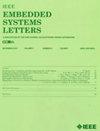Marine Monitoring System Powered by Flexible Solar Panel
IF 1.7
4区 计算机科学
Q3 COMPUTER SCIENCE, HARDWARE & ARCHITECTURE
引用次数: 0
Abstract
Renewable energy sources are more commonly used in photovoltaic panel devices due to their high-power conversion efficiency, mechanical robustness, and multiple power levels capable of adapting to different applications. We present the design and implementation of a marine life monitoring system powered by a flexible photovoltaic panel. This monitoring system is implemented with a Raspberry Pi Zero W board to control (turn on/off) a night camera. It has a field of view of 2 m and a bank of light-emitting diodes placed in a submersible polyvinyl chloride casing. The monitoring system can continuously acquire 1440 images over 24 h, with an energy consumption of 28.2 W/h. The system was tested by acquiring images of sea urchins Diadema antillarum in shallow waters of the Mexican Caribbean in the coral reef located in Xahuaxol.由柔性太阳能电池板供电的海洋监测系统
本文章由计算机程序翻译,如有差异,请以英文原文为准。
求助全文
约1分钟内获得全文
求助全文
来源期刊

IEEE Embedded Systems Letters
Engineering-Control and Systems Engineering
CiteScore
3.30
自引率
0.00%
发文量
65
期刊介绍:
The IEEE Embedded Systems Letters (ESL), provides a forum for rapid dissemination of latest technical advances in embedded systems and related areas in embedded software. The emphasis is on models, methods, and tools that ensure secure, correct, efficient and robust design of embedded systems and their applications.
 求助内容:
求助内容: 应助结果提醒方式:
应助结果提醒方式:


